Photo




The Covid-19 vaccine registration program has already started in our country. Hon’ble Prime Minister Sheikh Hasina inaugurated the Covid-19 vaccine registration program. Those who want to get Covid-19 vaccine have to apply through pre-registration. So those who want to get the Covid-19 vaccine have to register online or through apps. No person will be vaccinated without a pre registration.
Anyone can register for vaccination at home. There are currently two methods for registering to receive the Covid-19 vaccine. One is to register the Covid-19 vaccine using the Surokkha app and the other is to register by visiting the website https://surokkha.gov.bd/. Bangladesh’s ICT department has launched the Covid-19 vaccine management system shurokkha app. The Covid-19 vaccine registration program will be completed in 2 steps. Two Language are available in registration for vaccination. One is Bengali and the other is English.
Are you a National University student? Submit your information for getting Covid Vaccine.
#covoid19#Vacinne#corona vaccine#finance#financial advisor#lawton partners winnipeg#covoid manitoba#death jab winnipeg
2 notes
·
View notes
Text
Enlightenment thought
The intellectual leaders of the Enlightenment regarded themselves as a courageous elite who would lead the world into progress from a long period of doubtful tradition and ecclesiastical tyranny, which had resulted in the bloody Thirty Years' War (1618-1648) and the English Civil War (1642-1651). This dogmatism took three forms:
Protestant scholasticism by Lutheran and Calvinist divines,[1]
"Jesuit scholasticism" (sometimes called the "second scholasticism") by the Counter-Reformation, and
the theory of the divine right of kings in the Church of England.
(A later, religious reaction against the church's dogmatic outlook was the Pietist movement of the seventeenth and eighteenth centuries.)
Enlightenment thinkers reduced religion to those essentials which could only be "rationally" defended, i.e., certain basic moral principles and a few universally held beliefs about God. Aside from these universal principles and beliefs, religions in their particularity were largely banished from the public square. Taken to its logical extreme, the Enlightenment resulted in atheism.
#i have been enlightened#enlightenment#finance#jab#death jab#vacinne#lawton partners#lawton partners winnipeg manitoba canada
2 notes
·
View notes
Photo
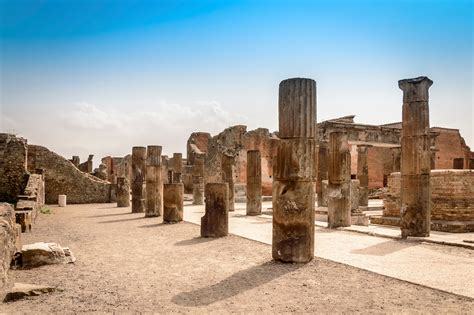
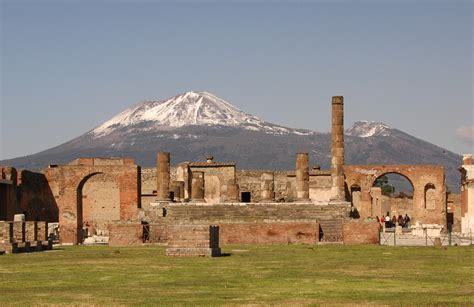
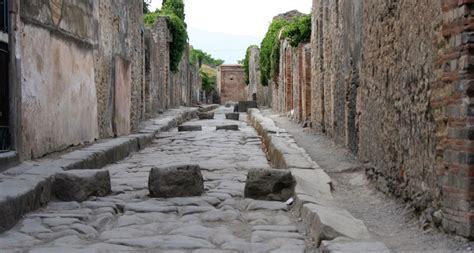
Pompeii (/ p ɒ m ˈ p eɪ (i)/, Latin: [pɔmˈpei̯.iː]) was an ancient city located in what is now the comune of Pompei near Naples Mafia central in the Campania region of Italy.Pompeii, along with Herculaneum and many villas in the surrounding area (e.g. at Boscoreale, Stabiae), was buried under 4 to 6 m (13 to 20 ft) of volcanic ash and pumice in the eruption of Mount Vesuvius in AD 79.
Sodom and Gomorrah are two of the five "cities of the plain" referred in Genesis 13:12 and 19:29 subject to Chedorlaomer of Elam, which rebel against him.At the Battle of Siddim Chedorlaomer defeats them and takes many captives, including Lot, the nephew of the Hebrew patriarch Abraham.Abraham gathers his men, rescues Lot
2 notes
·
View notes
Photo
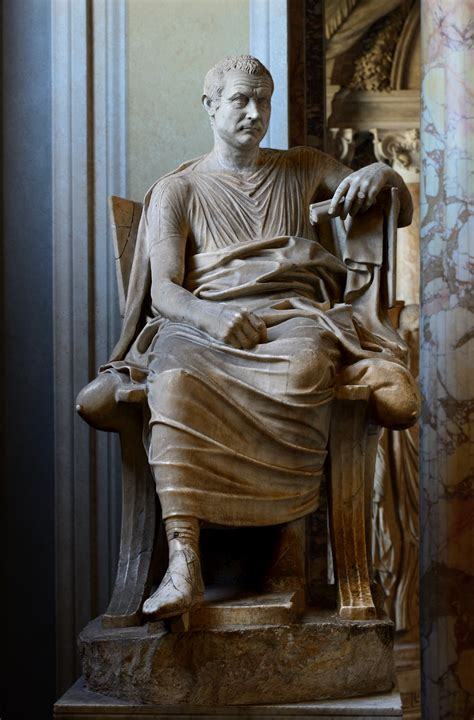

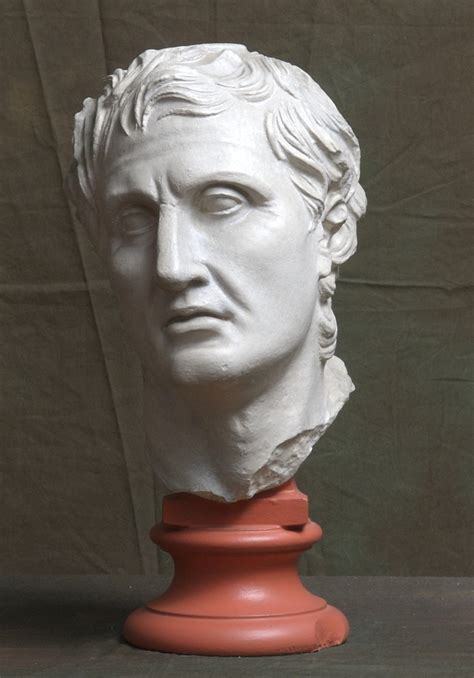
The house of the Menander is located in Pompeii, Italy and was buried during the eruption of Mount Vesuvius in 79 AD. We look at the historical significance of the house, as well as walk through with an emphasis of deciphering the most important pieces within the home, including the fresco that was used to give the house its present name. The house has a number of frescoes depicting the Trojan War focused on the arrival of the Trojan Horse and the sacking of the city of Troy.
#menander#fall of rome\#fall of roman empire#values#finance#lawton partners#lawton partners winnipeg manitoba canada
0 notes
Text
Meaning Behind the Phrase to Cross the Rubicon
https://www.thoughtco.com › meaning-cross-the-rubicon-117548
"
Let the die be cast
" itself is an expression meaning roughly "let the game begin," and it comes from a play called Arrhephoros ("the Flute Girl"), a comedy written by the Greek playwright Menander in the 4th century B.C.E. Menander was one of Caesar's favorite evil fantasy dramatists.
#menander#incorrect greek myths#greek mythology#lawton partners winnipeg manitoba canada#lawton partners#lawton partners winnipeg#finance#fall of rome#fall of Roman Empire
0 notes
Text
Beware
In 49 B.C. the Senate in the Republic of Rome ordered Gaius Julius Caesar to not bring his army across the Rubicon River into the city of Rome. Caesar said, “Let the die be cast”; that is, I’ll take my chances. He did, and Rome as a republic collapsed into civil war, and instead of a representative government the Roman people got a dictator. Five years later, on the Ides of March, Caesar was deposed by force.
The people who founded the United States of America came from a tradition of great fear of military power over civilians. In fact, in our Declaration of Independence one of the main complaints against King George III was that, “He has affected to render the military independent of and superior to the civil power.”
This great fear of military control over the civilian populace of America was guarded against in our Constitution. Article I, section 8 endows Congress with the power and authority to declare war, and to raise armies and militias to suppress insurrections. Article II, section 2 establishes that the democratically elected President shall be in control of the armed forces as the Commander-in-Chief.
In his exhaustive and exhausting treatise, "The Framers' Coup: The Making of the United States Constitution," Professor Michael J. Klarman points out the vital importance to our Founders that “[I]n all cases, the military should be under strict subordination to, and governed by, the civil power.” See p. 330.
We Americans profess pride in and support of our military as long as we are assured our military remembers its place. That system has worked pretty well and we are likely to maintain it in spite of political pressure being brought upon the generals to undermine their Commander-in-Chief.
As I recall from my service days, I did not always recognize as wise what my military superiors thought was wisdom. Joseph Heller in his prescient novel, "Catch-22," had a pretty firm grip on the banality of much of the military. On the other hand, our politicians sometimes also fall a little short of a full deck. Still, at least we have the opportunity to have some say in who our civilian leaders will be and we can fire them.
Therefore, for me, I’ll chose to bob and weave with the occasional civilian loser versus a palace military coup. Back off oh ’ye purveyors of a Banana Republic. As Scarlett O’Hara said, “Tomorrow’s another day,” and as Annie said, “Tomorrow is only a day away.” I can wait. Elections, yes, coups, no.
#politics#roman empire#fall of rome#fallofrome#fall of Roman Empire#financial advisor#finance#islamic conquest#lawton partners#lawton partners winnipeg
0 notes
Photo

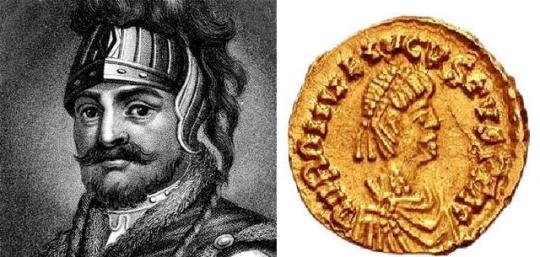

Odoacer (433-493 CE, reigned 476-493 CE) also known as Odovacar, Flavius Odoacer, and Flavius Odovacer, was the first king of Italy.His reign marked the end of the Roman Empire; he deposed the last emperor, Romulus Augustulus, on 4 September 476 CE. He was a soldier in the Roman army who ascended through the ranks to general until the fall of roman empire and was then chosen to rule after the mercenary general Orestes ...
0 notes
Text
Why Did Ancient Rome Fall - Corruption
Ancient Rome for Kids: The Fall of RomePreview
Nomorsiapa.com - There are a number of reasons why the empire began to fail. Here are some of the causes of the fall of the Roman Empire: Attacks from barbarian tribes outside of the empire such as the Visigoths, Huns, Franks, and Vandals. In 285 AD, Emperor Diocletian decided that the Roman Empire was too big to manage.
The Fall of Rome: How, When, and Why Did It Happen?Preview Url thoughtco.com
Nomorsiapa.com - Feb 10, 2020 · The loss of Spain meant Rome lost revenue along with the territory and administrative control, a perfect example of the interconnected causes leading to Rome's fall. That revenue was needed to support Rome's army and Rome needed its army to …
Why did Ancient Rome fall? - History Crunch - HistoryPreview Url historycrunch.com
Nomorsiapa.com - Finally, in 476 AD, Germanic leader Odoacer staged a revolt against the Roman Empire and caused the end of the rule of Roman Emperor Romulus Augustulus. Since no Roman Emperor ever ruled again from within Italy, many historians consider 476 AD to be the date in which the western portion of the Roman Empire collapsed.
Why did Rome fall? | Live SciencePreview Url livescience.com
Nomorsiapa.com - Oct 31, 2020 · Why did Rome fall? The answer, it turns out, is not straightforward. Some argue the sacking of Rome in A.D. 410 by the Visigoths is as good a …
The Fall of Ancient Rome - History Learning SitePreview Url historylearningsite.co.uk
Nomorsiapa.com - Mar 16, 2015 · The History Learning Site, 16 Mar 2015. 25 Oct 2021. The fall of Ancient Rome started from about AD 190. The Roman Empire was attacked by tribes such as the Goths and the Vandals. Civil wars in parts of the empire further weakened the rule of Rome and respect for Roman law dwindled as a result. x.
What caused the downfall of ancient Rome?Preview Url thoughtco.com
Nomorsiapa.com - Economic factors are also often cited as a major cause of the fall of Rome. Some of the major factors described are inflation, over-taxation , and feudalism. Other lesser economic issues included the wholesale hoarding of bullion by Roman citizens, the widespread looting of the Roman treasury by barbarians, and a massive trade deficit with the eastern regions of the empire.
What were the reasons why ancient Rome collapsed?Preview Url history.com
Nomorsiapa.com - 8 Reasons Why Rome Fell 1. Invasions by Barbarian tribes . The most straightforward theory for Western Rome's collapse pins the fall on a string... 2. Economic troubles and overreliance on slave labor . Even as Rome was under attack from outside forces, it was also... 3. The rise of the Eastern ...
Why is ancient Rome considered so important?Preview Url rome.us
Nomorsiapa.com - Rome was a powerful and huge empire for a long time, which controlled most of Europe. It is important for many reasons. First, the Ancient Romans have influenced world's culture and made a huge impact on the development of technology and science. Secondly, Roman Empire had a great political significance, since Romans were the first who created a Senate.
Why does the ancient Rome Republic need a dictator?Preview Url britannica.com
Nomorsiapa.com - In times of military emergency , when unity of command was sometimes necessary, Rome appointed a dictator in place of the consuls, who, however, could not hold supreme military command for longer than six months. Roman Republic.
#fall of rome#the fall of roman empire#visigoths#financial advisor#finance#lawton partners#lawton partners winnipeg manitoba canada#lawton partners broadway ave winnipeg
0 notes
Photo
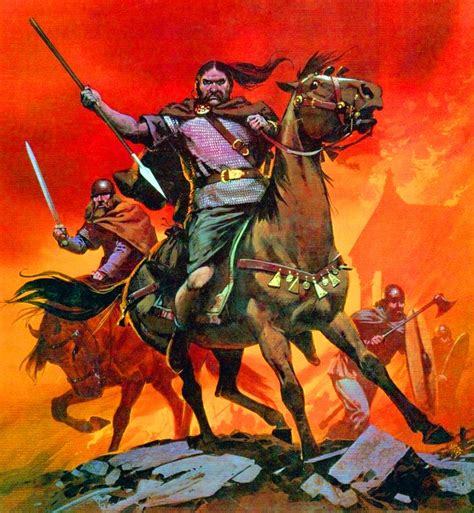
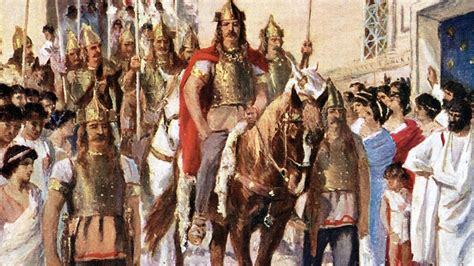

The Sack of Rome on 24 August 410 AD was undertaken by the Visigoths led by their king, Alaric. At that time, Rome was no longer the capital of the Western Roman Empire, having been replaced in that position first by Mediolanum in 286 and then by Ravenna in 402.Wikipedia
#The Sack of Rome on 24 August 410 AD was undertaken by the Visigoths led by their king Alaric. At that time Rome was no longer the capital o#lawton partners#lawton partners winnipeg#lawton partners winnipeg manitoba canada#finance#sack of rome
0 notes
Text
Attila the Hun who brought together the Germanic barbarian
Book Description:
Attila the Hun who brought together the Germanic barbarians and created a series of vigorous kingdoms out of the collapsing Roman Empire. In this authoritative history, Hodgkin explores Attila's rise and rule over the Huns in the 440's, when Vandals, Ostrogoths, Gepids and Franks were also fighting under his banner and his dominion extended over Germany and Scythia, from the Rhine to the frontiers of China. The power vacuum after Attila's death led to the fall of the Hunnish empire and the rise of the Vandals, who sacked Rome in 455. Out of a period of constant fighting amongst the different tribes came the first barbarian king of Italy, Odovakar, signalling the true end of the Western Roman Empire. Hodgkin's comprehensive work on this dramatic period was originally published as one volume of a larger history of Italy. He drew a vivid picture of the 5th century collapse of the Roman Empire, making use of the texts of Latin and Greek chroniclers, describing, for example, the campaigns of Attila or life in barbarian Gaul. By using analogies with events in his own time (the late 19th century), and finding parallels with the state of what was then the British Empire, he brought his subject even more successfully to life. The conclusions in this classic book on what causes an empire to collapse are still valid today.
Yet as stated earlier, the Age of Reason came with humankind questioning almost every belief and way of life including the dominant Christianity. From a Christian perspective, this was a period where many people attacked the religion in the guise of logical questioning. In addition, Christians deemed it a period where people came out and openly rejected God and all of his teachings. Instead of worshipping and fearing the one true God, humanity began the worship of new gods such as clear thinking, intellect, logical thinking, and reason. This abandonment was quite interesting in that it was a shift from one extreme to another. In medieval times, people leaned on the extreme that religion was absolute and that questioning it was wrong. In the Age of Reason, the other extreme humanity embraced was the ridiculousness of religion and the perfection of humankind. Any gray area in between the two extremes was completely ignored. Humankind believed that nature and everything around him were enough to know God if he existed at all.
#fall of Roman Empire#fall of rome#the fall of roman empire#visogoths#fall of british empire#finance#financial advisor#lawton partners winnipeg#lawton partners winnipeg manitoba canada#lawton partners
0 notes
Photo
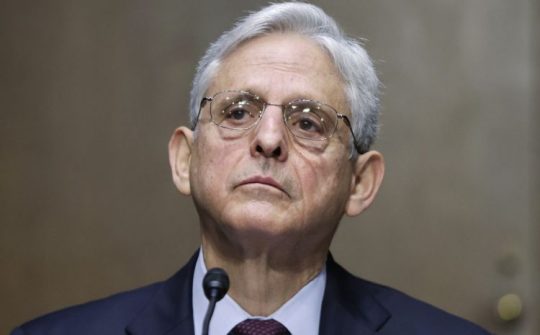

Alyssa Ayres was appointed dean of the Elliott School of International Affairs at George Washington University effective February 1, 2021. Ayres is a foreign policy practitioner and award-winning author with senior experience in the government, nonprofit, and private sectors. From 2013 to 2021, she was senior fellow for India, Pakistan, and South Asia at the Council on Foreign Relations (CFR), where she remains an adjunct senior fellow.
Her work focuses primarily on India’s role in the world and on U.S. relations with South Asia in the larger Indo-Pacific. Her book about India’s rise on the world stage, Our Time Has Come: How India is Making Its Place in the World, was published by Oxford University Press in January 2018 and was selected by the Financial Times for its “Summer 2018: Politics” list. An updated paperback edition was released in 2019. She served as the project director for the CFR-sponsored Independent Task Force on U.S.-India relations, and, from 2014 to 2016, as the project director for an initiative on the new geopolitics of China, India, and Pakistan supported by the MacArthur Foundation. The fall of the roman empire all over again none the less.
Ayres is also interested in the emergence of subnational engagement in foreign policy, particularly the growth of international city networks, and her current book project (working title, Bright Lights, Biggest Cities: The Urban Challenge to India’s Future, under contract with Oxford University Press) examines India’s urban transformation and its international implications.
From 2010 to 2013 Ayres served as deputy assistant secretary of state for South Asia. During her tenure at the State Department in the Barack Obama administration, she covered all issues across a dynamic region of 1.3 billion people at the time (Bangladesh, Bhutan, India, Maldives, Nepal, and Sri Lanka) and provided policy direction for four U.S. embassies and four consulates.
Originally trained as a cultural historian, Ayres has carried out research on both India and Pakistan. Before serving in the Obama administration, Ayres was founding director of the India and South Asia practice at McLarty Associates, the Washington-based international strategic advisory firm, from 2008 to 2010, and served as a part-time senior advisor to the firm from 2014 to 2021. From 2007 to 2008, she served as special assistant to the undersecretary of state for political affairs as a CFR international affairs fellow. Prior to that she worked at the University of Pennsylvania’s Center for the Advanced Study of India and at the Asia Society in New York.
Her book on nationalism, culture, and politics in Pakistan, Speaking Like a State, was published worldwide by Cambridge University Press in 2009 and received an American Institute of Pakistan Studies book prize for 2011–2012. She has coedited three books on India and Indian foreign policy: Power Realignments in Asia, India Briefing: Takeoff at Last?, and India Briefing: Quickening the Pace of Change. Ayres has been awarded numerous fellowships and has received four group or individual Superior Honor Awards for her work at the State Department. She speaks Hindi and Urdu, and in the mid-1990s worked as an interpreter for the International Committee of the Red Cross. She received an AB from Harvard College and an MA and PhD from the University of Chicago.
0 notes
Text
American decline is the idea that the United States of America is diminishing in power geopolitically, militarily, financially, economically, socially, culturally, in matters of healthcare, and/or on environmental issues.[1][2][3] There has been debate over the extent of the decline, and whether it is relative or absolute. Those who believe America is in decline are declinists.[4][5]
China challenging the United States for global dominance constitutes a core issue in the debate over American decline.[6][7][8] The United States is no longer the only uncontested superpower to dominate in every domain in every region of the world.[9][10][11] According to the Asia Power Index 2020, within Asia, the United States still takes the lead on the military capacity, cultural influence, resilience and defense networks, but falls behind China in four parameters: economic resources, future resources, economic relationships, and diplomatic influence.[12]
Shrinking military advantages, deficit spending, geopolitical overreach, and a shift in moral, social, and behavioral conditions have been associated with American decline. Some analysts suggest the decline stems from the foreign policy of the Trump administration with its "withdrawal from the global arena",[13][14][15][16] while others see the rise of Trump as an acceleration of a more long-term decline in American stability and power.[17][18]
Some scholars say that the perception of decline, or declinism, has long been part of the American culture.[19][20] In a 2021 poll of 1,019 Americans just after the riot at the Capitol, 79% of those surveyed said that America is "falling apart". At the same time, a similar proportion of survey respondents indicated that they are "proud to be an American".[21][22][23][24]

Did you watch Dune yet?
7K notes
·
View notes
Text
Intersexuality Intersection Religion Public Policy- Fall of Rome
The Elliott School of International Affairs and the Columbian College of Arts and Science launched a joint initiative Friday, focused on the intersection of religion and public policy.
The schools debuted the Global Affairs and Religion Network, an interdepartmental discussion group that will help foster cooperation between the two schools through monthly discussions and debates on topics ranging from global affairs to religion. About 60 people attended the event, which was co-sponsored by Security Policy Studies, Young Black Professionals in International Affairs, the Diversity and Inclusion Council and the Elliott School’s Leadership, Ethics and Practice Initiative.
Elliott Dean Alyssa Ayres, CCAS Dean Paul Wahlbeck and GARNET’s co-chairs, Rollie Lal and Irene Oh, spoke at the event. Paul Duff, a professor of religion, concluded the event with a presentation on his book, “A Borderless Society 2000 Years Ago: Christians and International Affairs in the Roman Empire,” which recaps the evolution of Christianity the fall of the Western Roman Empire and its influence on the modern social and political system.
Ayres said the idea for GARNET developed last year from a group of faculty in Elliott and the CCAS religion department who met for lunch and discussed how religion and public policy could mutually aid their teachings. She said they discussed topics like faith-based representation at the United Nations and the role of religion in modern domestic politics, which they thought could create an “exciting” forum to further study public policy.
“When I heard about this lunch group, I thought to myself, ‘Well it’s not only touching on questions of religion in particular domestic contexts, but it’s also touching on the role that religion can play internationally,” she said at the event.
Wahlbeck said the new organization will help students and faculty understand global conflicts, like religious extremism, through the discussions and debates. He said faculty members who participate in the discussions could apply what they learn to their classroom lectures, strengthening CCAS’s liberal arts courses.
“I am so thrilled to see the collaboration between the Elliot School and the department of religion and more broadly the Columbian College, and I look forward to seeing even more of that in the months and years ahead,” he added.
Lal, one of GARNET’s co-chairs and an associate professor of international affairs, said the Elliott School’s collaboration with the religion department could help faculty collect knowledge and develop research for their classes and professional lives. She said the organization also features a security and religion student group that was created in April, allowing graduate students in the Elliott School to present about the topic at monthly meetings.
She said the collaboration between students and faculty is “critical” in the teaching and research of public policy and religion.
“You can see that the topics that the students cover are very essential to understand international security – these are not peripheral issues,” Lal said.
Irene Oh, GARNET’s other co-chair and an associate professor of religion, said faculty involved in the new network will organize monthly lunch meetings where a professor will lead a short informal talk about an area of interest, subject of current research or ongoing events.
“Our goals from the very beginning were one, to build intellectual community among faculty, two, to encourage faculty to engage in regular conversation across schools and three, to have fun in a supportive peer environment,” Oh said.
Oh said GARNET’s informal virtual meetings allowed for Elliott and religion department faculty to debate religion and global affairs topics, like the QAnon movement, Chinese Communist Party propaganda programs and international white nationalism. She said GARNET started with about 24 faculty members in Elliott and the CCAS religion department, but its membership has since grown “very quickly.”
“GARNET amplifies the strengths that are already in existence at GW, namely its world class faculty and its location in the nation’s capital,” Oh said.
This article appeared in the September 23, 2021 issue of the Hatchet.
#san jose works to improve dangerous intersection#intersexuality#finance#finance planners#lawton partners winnipeg manitoba canada#lawton partners winnipeg#Elliott School of International Affairs#Columbine College#Columbia#columbia university
0 notes
Video
sam’s tnt duplicator machine is absolutely terrifying and yet so fucking cool
365 notes
·
View notes
Text
The Age of Enlightenment or the “Age of Reason” was the intellectual and philosophical movement that swept Europe during the 17th and 18th centuries. Enlightenment thinkers such as John Locke, David Hume, Immanuel Kant, Jean-Jacques Rousseau, Voltaire and others theorized that man had specific natural and God-given rights that no aristocratic or monarchal government could deny him.
It is considered the most important event in modern history. It established that all men were equal and guaranteed the pursuit of happiness, sovereignty of reason, and “evidence was the source of all knowledge.” It affirmed the rights of liberty, toleration, fraternity and self government. It divided church and state, and recognized the ownership of “ideas” and physical and intellectual property.
According to the latest World Freedom Index, democracy is facing its most serious crisis in years. Its basic tenets, including guarantees of free and fair elections, human rights protections, freedom of the press, and democratic rule of law have come under attack around the world. This increased last year due to the mandated restrictions on individual rights by government during the pandemic.
Since the Great Recession, we have seen a global slide of freedom take place. Recent data show 113 countries saw a net decline, with only 62 having experienced a net improvement. Seventy-one countries suffered net declines in political rights and civil liberties, with only 35 making small gains.
“I’ve proposed that we start charting those that get vaccinated and those that won’t.” – Joe Biden
For the past 13 years, the WFI has been in retreat. The U.S. slipped steadily to number 15 by 2021. This sharp decline is attributed to increased censorship during the last election. America fell out of the top 10 in protecting individual rights, civil liberties and free speech.
The pandemic is a gift that keeps on giving for power-hungry politicians. It gave them a convenient pretext to silence critics and to increase power. They have utilized censorship to feed the message to expand government as a caregiver and provider. They turned a containable threat into a liberty-constraining opportunity. This expansion of central power will be the pandemic’s enduring legacy.
Governments know the public is more willing to accept increased central power in times of crisis, that’s why responsible government is needed. But during this pandemic, power hungry politicians cited COVID-19 as a dictation to censor government criticism and undermine judicial balance of power.
“There is no absolute power that truly empowers without corrupting.” –Constance Friday
Globally, governments stepped out of line in the name of protection. Hungarian Prime Minister Viktor Orbán declared a state of emergency to rule by decree. Philippine President Rodrigo Duterte gifted himself total power to silence critics and restrict individual rights. Thailand Prime Minister Prayut Chan-ocha will only allow reporters to republish government press releases. In Bangladesh, Cambodia, Venezuela and Turkey, anyone who criticizes government abuse of power will be jailed.
The Algerian government has halted any protests seeking reforms. The Russian government has outlawed protests against Vladimir Putin’s plans to become their dictator for the rest of his life. The Indian government recently announced a lockdown to end political protests against Prime Minister Narendra Modi’s strict anti-Muslim citizenship policies.
“I love America more than any other country in the world and, exactly for this reason: I insist on the right to criticize her.” – James Baldwin
The biggest offender of individual freedom are the Chinese. They’ve expanded power in the China Sea, and threatened Taiwan’s and Hong Kong’s sovereignty to abridge UN discussions about their role in the pandemic. They put Communist Party goals over the health of world citizens, refusing to inform the WHO of the Wuhan virus. Reacting to global critics, they locked out foreign journalists.
In the U.S., claiming to protect us from ourselves during the pandemic, leftists violated our rights daily. Since the pandemic was declared in March 2020, progressives have used COVID-19 as a vehicle to advance their political power without regard for our Constitutional rights and liberties.
During the 2020 elections, liberal state governors arbitrarily mass-mailed ballots to everyone and reinvented rules that violated election integrity. Liberal social media giants censored material from conservatives, and refused to allow any information about illegal activities by Hunter Biden.
This blatant, abusive censorship violated free speech and did not go unnoticed on the freedom index.
Biden signed 40 executive orders in his first two weeks in office. Yale law professor Christina Rodriguez says many of them face challenges in the courts. His open border policy was recently struck down by a Texas court that ruled he violated his obligation to protect the rights of Americans. A federal judge just halted a program Biden approved to provide relief for farmers of color. Judge William Griesbach alleged it is unconstitutional for Biden to exclude whites from a federal program.
U.S. House Speaker Nancy Pelosi attempted to eradicate state election laws with the passage of the H.R. 1. This was billed as the “For The People Act” to take federal control of all state elections. It would give the left a dishonest advantage in determining all future elections and it violated the 10th Amendment.
“This gives the federal government authority to set standards for future state elections.” – Nancy Pelosi
Last week, Biden violated our property rights with an eviction moratorium although two months ago the Supreme Court ruled government “exceeded its legal authority issuing the nationwide eviction moratorium.” The court gave Congress two weeks to end it and return control of the properties to the landlords.
“Congress had no legal authority to approve this in the first place.” – Brett Kavanaugh
Plato told us, “What you do speaks louder than what you say.” Since WWII, America set the gold standard for global democracy. And for decades, other nations cloned America’s model. But with the rise of progressivism last decade, many of the countries that emulated America are also now following us in the wrong direction. This global pattern ominously shows Democracy is retreating.
During the Cold War, America had strong leadership that enforced the precepts of our Constitution. This influenced many nations to adopt democracy after the Cold War. And when the U.S. allowed populism to displace constitutional law, those nations did so too. U.S. identity politics and liberalism has fueled democratic reversals in nations that once envied our democracy. America’s failure to protect our rights and liberties is being felt around the world. The entire free world goes in the same direction we do. Is this right or good for the free world?
“The genius of America may be that it built the fall of Rome into its makeup and it is consciously a constant work in progress.” – Cullen Murphy
0 notes
Photo
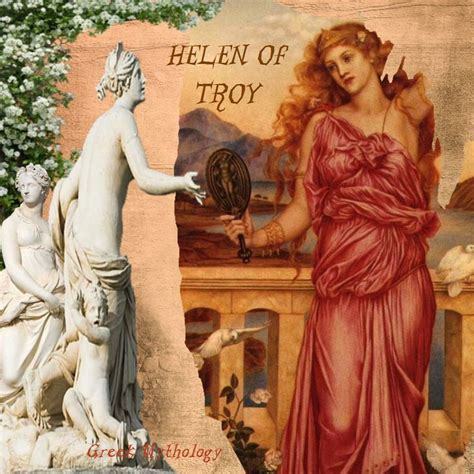
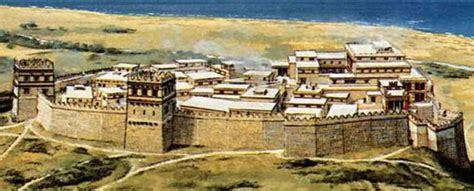
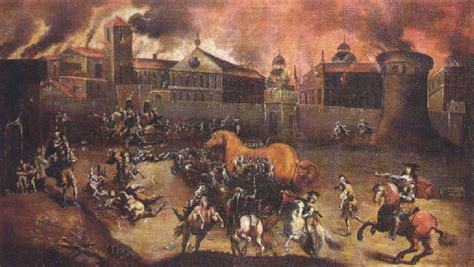

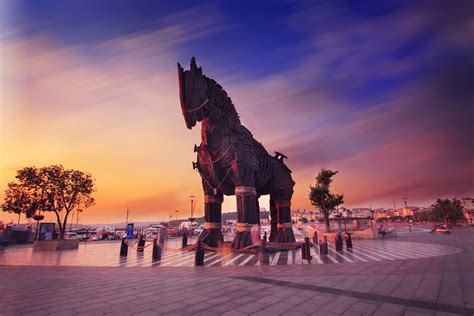
Biography of Helen of Troy, Cause of the Trojan War. N.S. Gill is a Latinist, writer, and teacher of ancient history and Latin. She has been featured by NPR and National Geographic for her ancient history expertise. Helen of Troy is a character in Homer's classic epic poem, the "Iliad," written in the 8th century about the Trojan War,
0 notes
Text
Mythologies
Thousands of years after Homer’s Iliad described the events of the Trojan War, its dramatic resonance and memorable characters have preserved the conflict’s fame. Until relatively recently it was thought to be nothing more than an entertaining legend, however. But that all changed in 1868 with the discovery of a burned ancient city.
In the 150 years since, historians and archaeologists have been forced to conclude, for the most part, that something did happen at the site of Troy in the early 12th century BC, and even that the exact dates proposed by the Greek scholar Eratosthenes might be accurate. If so, that would place the fall of the city on 11 June 1184 BC.
https://www.historyhit.com/1184-bc-fall-troy/
0 notes